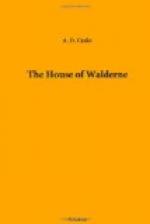“Wilt thou be true to me till death?”
the anxious lover cried.
“Ay, while this mortal form hath breath,”
Alicia replied.
“Come, go to bed,” said Sir Nicholas, entering, and they went: To bed, but not to sleep.
On the morrow the sun shone brightly on the castle, on the church, on the hilltop, and on the wooded valley of Walderne. The household assembled first for a brief parting service in the castle chapel, for it was an old proverb with them, “mass and meat hinder no man,” and then the breakfast table was duly honoured.
And then—the last parting. Oh how hard to speak the final words; how many longing, lingering looks behind; how many words, which should have been said, came to the mind of our hero as he rode through the woods, with his squire and six men-at-arms, who were to share his perils and his glory.
Sir Nicholas was by his side, for he had determined to see the last of Hubert, who had wound himself very closely round the old knight’s heart; and together they rode through Hailsham to Pevensey.
The first part of their journey was through a dense and tangled forest, which extended nearly to Hailsham. It passed through the district infested by the outlaws, and, although they had never molested Sir Nicholas, nor he them, they were dangerous to travellers of rank in general, and few dared traverse the forest roads unattended by an escort. In the depths of these hoary woods were iron works, which had existed since the days of the early Britons, but had of late years been completely neglected, for all the thoughts of the Norman gentlemen or the Saxon outlaws were concentrated on war or the chase.
Hailsham (or, as it was then called, Hamelsham) was the first resting place, after a ride of nearly nine miles. It was an old English settlement in the woods, which had now become the abode of a lord of Norman descent, who had built a castle, and held the town as his dependency. However, the races were no longer in deadly hostility—the knights had their liberties and rights, and so long as they paid their tribute duly, all went as well as in the olden time, before the Conquest; albeit the curfew from the old church tower each night told its solemn tale of subjection and restraint, as it does even now, when the old ideas have quite departed, and few realise what it once meant.
Over the flat marshes to Pevensey, marshes then covered at high tide—leaving on the left the high lands of Herstmonceux, where the father of “Roaring Ralph” of that ilk still resided, lord paramount. The castle was hidden in the trees. The church stood bravely out, and its bells were ringing a wedding peal in the ears of the parting knight. How tantalising!
Pevensey now reared its giant towers in front. There reigned the Queen’s uncle, Peter of Savoy, specially exempted from the sentence of exile which had fallen upon the rest of the king’s foreign kindred.




